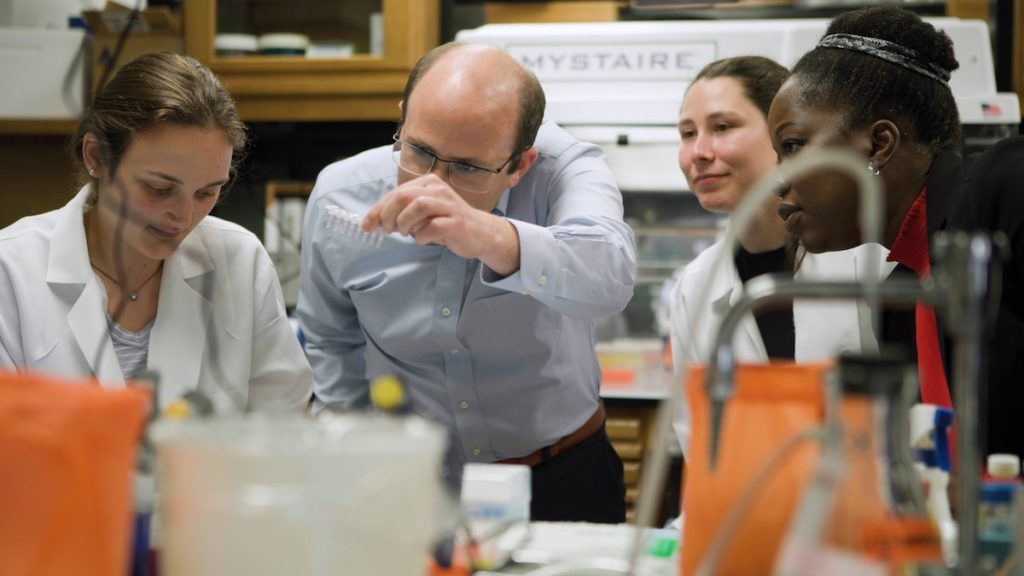RUNX1

The RUNX1 gene provides instructions for making RUNX1 protein, which plays a vital role in the production of blood stem cells and the maintenance of a healthy blood system throughout life. RUNX1-FPD patients have a hereditary mutation that causes symptoms such as bleeding and easy bruising, which can require limiting daily activities and cause allergic conditions and autoimmune diseases. But far more significantly, RUNX1-FPD greatly increases the risk of developing blood cancers, predisposes patients to leukemia and lymphoma at a rate of up to 50 percent over their lifetime.
RUNX1 Familial Platelet Disorder is a very rare disease. It’s estimated that just 20,000 people across the entire nation have the condition. But for Montecito couple and Crane School parents Tim and Monica Babich, the numbers don’t matter, as both Tim and their eldest son, now 13, both have the disorder. In fact, it was the discovery that the boy also had the inherited disease that spurred the high-powered couple – who moved to Montecito from London to slow down from stressful careers in finance, consulting, and management – to found a nonprofit to confront the situation.
The RUNX1 Research Program (RRP) was created to increase awareness of the blood disorder, support patients and physicians in diagnosing the disease, and, perhaps most importantly, to coordinate research into finding solutions in an area – cancer prevention – that is severely underfunded.
“Our main goal is to prevent cancer, and that’s what our research focuses on,” said Alex Gonzalez, the organization’s Director of Development. “We’re trying to stop it before it even starts, because once an individual has a cancer such as leukemia, there are only a few therapies available, and they’ve already transformed. So we’re trying to get ahead of it for folks who have this mutation to stop it before it starts.”
In its goal to blaze a path to transform scientific discoveries from the lab into tangible treatments for patients and their doctors as quickly as possible, RUNX1 Research Program has already launched two clinical trials with two more on the way, just seven years after the nonprofit was founded. The key has been to focus its cancer prevention discovery model on drug repurposing strategy, knowing that developing novel therapies costs billions and takes close to 15 years, with a failure rate of more than 90 percent. For a rare disease like RUNX1-FPD – with both an active patient community and an extreme sense of urgency – RRP needed to implement alternative paths to discovering treatments. The nonprofit’s current trials are testing existing medicines, often those that are cheaper generic versions, that can help make treatments more accessible to people everywhere.
RRP funded 24 research projects that either tested existing medicines or found specific cell problems due to RUNX1 mutations that could be treated with an existing medicine. As a result of these efforts, two drugs – Imatinib and Sirolimus – have moved from the bench to bedside within the last 12 months, while two additional drugs – Etanercept and Ruxolitinib – have emerged as potential treatment candidates.

“Because the drugs have already been approved by the FDA, we have immediate availability,” Gonzalez explained. “That also greatly lowers the risk of unexpected side effects. And repurposing can provide new treatment options for diseases and also enhance understanding of disease mechanisms and drug actions in general.”
Meanwhile, RUNX1-FPD still remains widely unknown, which is why the organization’s work also includes educating both the public and physicians, Gonzalez said.
“The disease is often underdiagnosed or misdiagnosed for many years. Unfortunately, oftentimes it’s only when someone has already developed blood cancer that they get the genetic testing and find out that they have RUNX1-FPD. Some catch it earlier because, since it’s a generational disease, if there’s blood cancer in their family history, they will get tested and diagnosed that way. But many physicians don’t even consider this disorder.”
The nonprofit is committed to providing medical education to clinicians, including information on what tests to administer so that individuals walking around with inherited blood disorders that increase their risk of blood cancer can get the appropriate diagnosis.
“We have a whole medical education series to explain why it’s important to analyze inherited genetic information in patients with blood cancers, to emphasize how common harmful and inherited genetic changes are in patients with blood cancers, and showing the risks of missing or incorrect diagnoses and how they affect patient health,” Gonzalez explained.
RRP also works directly with patients, providing multiple avenues for them to become involved as advocates and experts, such as the Research Guided by Patient Committee (RGPC).
“We place a priority on understanding their diagnostic journey, offer opportunities for peer-to-peer support, continuously develop useful educational tools and encourage engagement in co-designing research,” Gonzalez said.
While RRP has been remarkably efficient and moving forward, expanding its programs requires additional funding. What’s important to remember, he said, is that supporting RRP’s efforts is an investment in cancer prevention research – the discovery of a blood cancer prevention therapy would not only impact RUNX1-FPD patients but could also pave the way for blood cancer prevention in other high-risk populations in the general public.
“Historically, there haven’t been a lot of funds going towards cancer prevention, catching cancer and stopping it before it starts,” Gonzalez said. “Investing in our organization would not only have an impact on this patient population and other familiar blood disorders, but also enhance discovery of a prevention cancer therapy for a lot of other diseases.”







You must be logged in to post a comment.